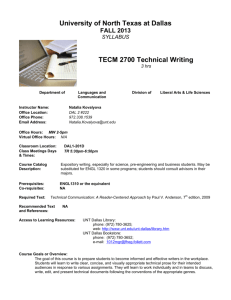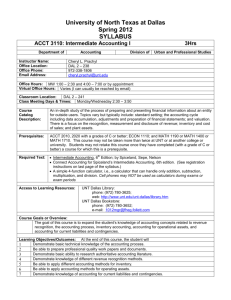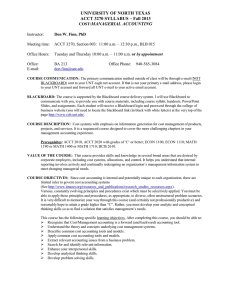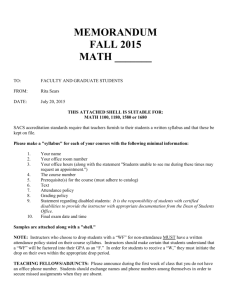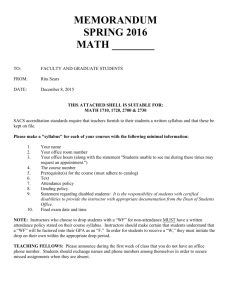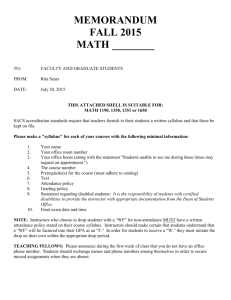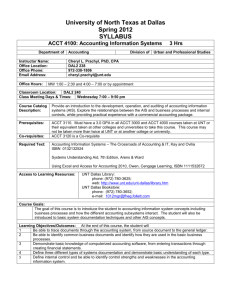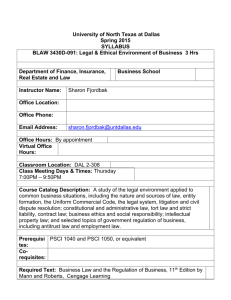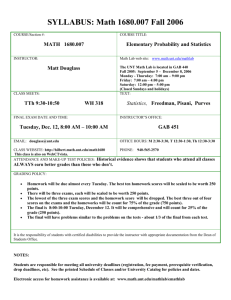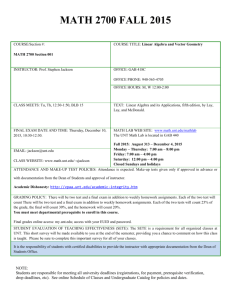University of North Texas at Dallas Fall 2015 SYLLABUS
advertisement
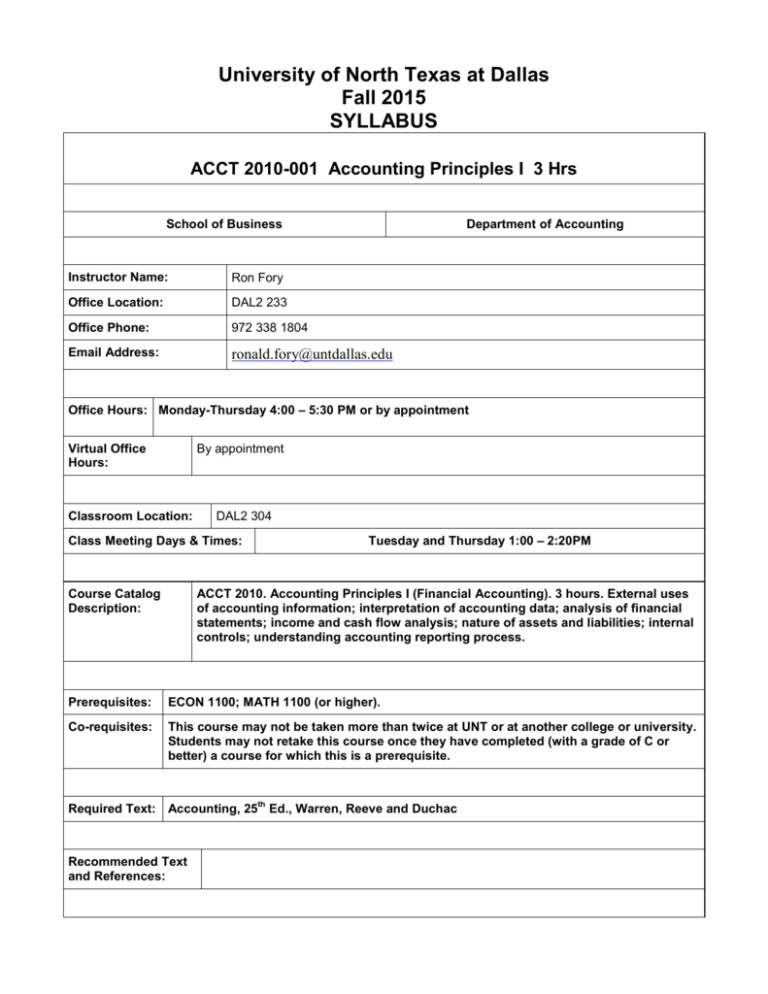
University of North Texas at Dallas Fall 2015 SYLLABUS ACCT 2010-001 Accounting Principles I 3 Hrs School of Business Department of Accounting Instructor Name: Ron Fory Office Location: DAL2 233 Office Phone: 972 338 1804 Email Address: ronald.fory@untdallas.edu Office Hours: Monday-Thursday 4:00 – 5:30 PM or by appointment Virtual Office Hours: By appointment Classroom Location: DAL2 304 Class Meeting Days & Times: Course Catalog Description: Tuesday and Thursday 1:00 – 2:20PM ACCT 2010. Accounting Principles I (Financial Accounting). 3 hours. External uses of accounting information; interpretation of accounting data; analysis of financial statements; income and cash flow analysis; nature of assets and liabilities; internal controls; understanding accounting reporting process. Prerequisites: ECON 1100; MATH 1100 (or higher). Co-requisites: This course may not be taken more than twice at UNT or at another college or university. Students may not retake this course once they have completed (with a grade of C or better) a course for which this is a prerequisite. th Required Text: Accounting, 25 Ed., Warren, Reeve and Duchac Recommended Text and References: Access to Learning Resources: UNT Dallas Library: phone: (972) 780-3625; web: http://www.unt.edu/unt-dallas/library.htm UNT Dallas Bookstore: phone: (972) 780-3652; e-mail: 1012mgr@fheg.follett.com Course Goals or Overview: The goal of this course is to provide a foundation for the study and application of the accounting function, for both users of accounting information and practitioners of accounting, such that operational imperatives, as well as legal and regulatory requirements are understood in the context of ethically sound business practices. That includes development of critical thinking skills, teamwork, and technical competence in the field of accounting. Learning Objectives/Outcomes: At the end of this course, the student will be able to 1 Prepare, interpret and analyze accounting information for a variety of business entities. 2 Demonstrate the ability to translate accounting data into business decision support information. 3 Define the various costs encountered in accounting and how they relate to the accounting cycle. 4 Identify ethical pitfalls and how to counter them with effective internal controls. 5 Apply Generally Accepted Accounting Principles (GAAP) in preparation of financial statements. 6 Adjust a Trial Balance with adjusting accounts to prepare financial statements in a variety of formats. 7 Account for receivables, plant assets, intangibles, liabilities and payroll. Course Outline This schedule is subject to change by the instructor. Any changes to this schedule will be communicated by class announcement as well as posting on Blackboard as soon as the change is determined. TOPICS TIMELINE 1. Ch 1 - Accounting Fundamentals: Principles, Transactions, and Financial Statements with Ratio Analysis 08/25–08/27 2. Ch 2 - Transactions; Account Classification; Trial Balance; Analysis 09/01–09/03 3. Exam 1: Ch 1-2 Ch 3 - Adjusting Process and Preparation of Financial Statements 09/08 09/10-09/15 4. Ch 4 - The Accounting Cycle and Preparing a Classified Balance Sheet; Current Ratio and Working Capital 09/17–09/22 5. Exam 2: Ch 3-4 Ch 6 - Accounting for Merchandising Purchases and Sales; Net Sales to Assets 09/24 09/29-10/01 6. Ch 7 - Inventory Methods and Valuation; Estimation; Inventory Turnover and Days' Sales in Inventory 10/06-10/08 7. Exam 3: Ch 6-7 Ch 8 – Sarbanes-Oxley, Cash and Internal Controls 10/13 10/15-10/20 8. Ch 9 - Receivables: Recognition, Valuation, Estimation, and Disposition; Accounts Receivable Turnover 10/22-10/27 9. Exam 4: Ch 8-9 Ch 10 – Fixed Assets and Intangible Assets; Fixed Asset Turnover Ratio 10/29 11/03-11/05 10. Ch 11 - Current Liabilities and Payroll: Defining, Classifying, and Estimating; Quick Ratio 11/10-11/12 11. Exam 5: Ch 10-11 Ch 12 – Partnerships and LLCs: Forming, Changing Partners, Liquidating 11/17 11/19-11/24 THANKSGIVING HOLIDAY 11/26 12. Ch 13 –Corporations: Organization; Stock; Dividends; Equity Reporting; Earnings Per Share 12/01-12/03 13. Review 12/03/15 14. Final Exam: Comprehensive. 12/08/15 Course Evaluation Methods This course will utilize the following instruments to determine student grades and proficiency of the learning outcomes for the course. Classes consist of a mix of lectures, discussion of case studies, and presentation of homework exercises and problems by students. Homework – exercises designed to reinforce chapter material and ensure understanding of concepts, expanded by classroom presentation by students. Exams – written tests designed to measure knowledge of presented course material and ability to apply appropriate concepts in practical settings. Research Projects – assignments designed to measure ability to apply presented course material and present the results in both written and verbal forms in research of a business topic. Grading Matrix: Instrument Homework Team Project Presentations Chapter Exam Final Exam Lowest Quiz Value (points or percentages) Prorated between 12 chapters 1 exercise at 100 points 5 exams at 100 points each 1 exam at 200 points Total: Total 100 100 500 200 - 100 800 Grade Determination: A = 720-800 pts; i.e. 90% or better B = 640-719 pts; i.e. 80 – 89 % C = 560-639 pts; i.e. 70 – 79 % D = 480-559 pts; i.e. 60 – 69 % F = 479 pts or below; i.e. less than 60% University Policies and Procedures Students with Disabilities (ADA Compliance): The University of North Texas Dallas faculty is committed to complying with the Americans with Disabilities Act (ADA). Students' with documented disabilities are responsible for informing faculty of their needs for reasonable accommodations and providing written authorized documentation (available in the Student Life Office). Grades assigned before an accommodation is provided will not be changed as accommodations are not retroactive. For more information, you may visit the Student Life Office, Suite 200, Building 2 or call Student Life at 972-780-3632. Student Evaluation of Teaching Effectiveness Policy: The student assessment of academic effectiveness (course evaluation) is a requirement for all organized classes at UNT. This short survey will be made available to you at the end of the semester, providing you a chance to comment on how this class is taught. I am very interested in the feedback I get from students, as I work to continually improve my teaching. I consider this evaluation to be an important part of your participation in this class. Therefore, you will be expected to complete the evaluation and provide me a copy of the acknowledgement you receive on completion of the survey (your input is not indicated on the acknowledgement, only that you completed it, so your responses are kept confidential and anonymous). In return for your completion of this survey, you will earn 5 points of extra credit. Assignment Policy: Homework assignments are designed to assist in understanding the chapter material. You may rework the homework assignments as many times as you like, and I encourage you to do them until you feel comfortable with the process. You are not graded on your homework; the result of your efforts with homework will be evident in your exam grades. You must read the chapter assignments and review the chapter PowerPoint slides before class and be prepared to discuss them. I will not lecture, rather I will lead discussions on the chapter topics and students will be assigned weekly to work homework problems in class. If you are not prepared you will not be able to learn. Team research assignments will be based on the finished product and the presentation by the team. All team members must participate in the preparation and presentation of team results. All team members will receive the same point score; team members who do not participate will get no points. Team assignments will be explained in detail at the appropriate time in class and in the written assignment. Exam Policy: Exams should be taken as scheduled. Exams will be in class, on paper, using Scantron forms; no extraneous material will be allowed on desks/tables during exams, and calculators cannot be capable of being programmed. The instructor/proctor will reseat students as necessary to insure independence and to remove any student appearing to violate the integrity policy during exams. No makeup examinations will be allowed except for documented emergencies (See Student Handbook). Academic Integrity: Academic integrity is a hallmark of higher education. You are expected to abide by the University’s code of Academic Integrity policy. Any person suspected of academic dishonesty (e.g., cheating or plagiarism) will be handled in accordance with the University’s policies and procedures. Refer to the Student Code of Academic Integrity at http://www.unt.edu/unt- dallas/policies/Chapter07StudentAffairs,Education,andFunding/7.002CodeofAcademicIntegrity.pdf for complete provisions of this code. Bad Weather Policy: On those days that present severe weather and driving conditions, a decision may be made to close the campus. In case of inclement weather, call UNT Dallas Campuses main voicemail number (972) 780-3600 or search postings on the campus website www.unt.edu/dallas. Students are encouraged to update their Eagle Alert contact information, so they will receive this information automatically. There will be study information on Blackboard for those occasions class cannot be held on campus, whether due to bad weather or other requirements. Attendance and Participation Policy: The University attendance policy is in effect for this course. Class attendance and participation is expected because the class is designed as a shared learning experience and because essential information not in the textbook will be discussed in class. The dynamic and intensive nature of this course makes it impossible for students to make-up or to receive credit for missed classes. Attendance and participation in all class meetings is essential to the integration of course material and your ability to demonstrate proficiency. Students are responsible to notify the instructor if they are missing class and for what reason. Students are also responsible to make up any work covered in class. It is recommended that each student coordinate with a student colleague to obtain a copy of the class notes, if they are absent. Diversity/Tolerance Policy: Students are encouraged to contribute their perspectives and insights to class discussions. However, offensive & inappropriate language (swearing) and remarks offensive to others of particular nationalities, ethnic groups, sexual preferences, religious groups, genders, or other ascribed statuses will not be tolerated. Disruptions which violate the Code of Student Conduct will be referred to the Center for Student Rights and Responsibilities as the instructor deems appropriate. Other Policies: - Use of Blackboard Learn. Blackboard Learn is an important communication and education tool. You will be expected to be competent in this technology, and to inform the instructor if you need help. If you choose not to access Blackboard Learn, you will not be able to complete the course, since homework and some exams are administered through this portal. - Use of Cell Phones & other Electronic Gadgets in the Classroom. Cell phones are permitted in the classroom, but must be set to “vibrate” or “silent” during class. Answer calls outside, if you must, but cell phone conversations, texting, and similar activities will not be permitted in the classroom. Other electronic devices may be used in the classroom in a demonstrable application of educational assistance. If you question the appropriateness of the device in the classroom, ask the instructor for guidance. - - - Food & Drink in the Classroom. You are expected to be responsible adults in this class. Drinks are acceptable in class, so long as there is a means of controlling a spill (such as a cup lid). You are expected to police your own area – it should be clean when you arrive, and you should leave it clean when you leave. Food is generally a disruptive agent during class, so you should confine yourself to suffering your hunger in silence during the class period. If you forget, I shall remind you. Use of Laptops. You are encouraged to use laptops, iPads, and similar devices to assist in taking notes and researching topics related to the class. They must not be used for social activities, games, etc., during class time. Students using devices for other than class related purposes will be required to leave the classroom. Grade of Incomplete, “I” - This grade is given in very specific time periods and circumstances. Consult your Student Handbook for details.
